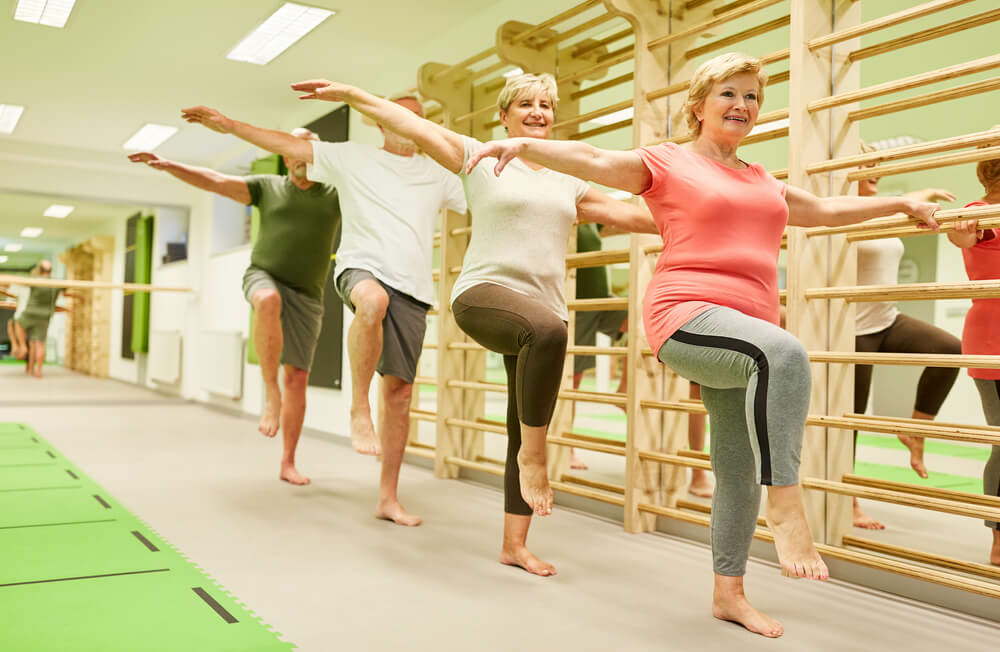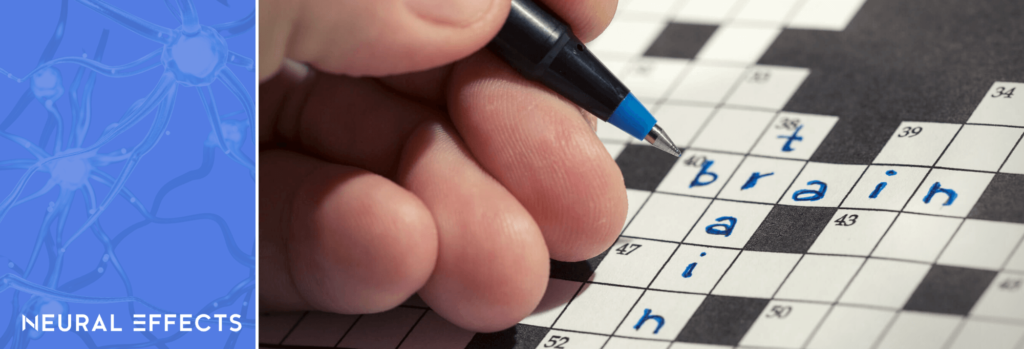While there is no known way to prevent or stop Alzheimer’s disease or other types of dementia, it is possible to slow down the progression of the disease. Slowing dementia can be accomplished with therapy aimed at protecting physical and cognitive abilities, as well as through certain lifestyle choices.
In this article, we suggest practical steps you can take to slow down the progression of symptoms, regardless of whether you’re acting preventatively or you already have a dementia diagnosis. Some of our patients come to Neural Effects because they believe they’re at risk of developing dementia and want to start working on their brains early.
We’ll explain why we believe our dementia treatment protocol is the most effective way to slow down dementia-related physical and cognitive decline. In addition, we also list helpful therapy modalities and tips for beneficial lifestyle changes.
We don’t address medication or supplements in this post, but you can find more information about them here:
- Natural dementia treatment (including supplements, aromatherapy, etc.)
- How to help dementia patients (includes a discussion of medication, including our views about Aducanumab, which was recently approved by the FDA to treat dementia patients)
Neural Effects uses the latest evidence-based techniques to diagnose and help dementia patients. We are located in Provo, Utah, and serve anyone in Salt Lake City or the Utah Valley area. We are in network for most types of medical insurance. Schedule your evaluation today.
Most Reliable Treatment to Slow Down Dementia
Many doctors (including neurology experts) and clinics don’t offer therapy for dementia. Among those that do, each type of therapy is usually administered independently of any other therapy. That means patients need to visit a series of healthcare professionals who might not communicate with each other about how their patient is progressing.
At Neural Effects, we believe there is a better way to provide dementia care for our patients. In our EMPOWER program, we use a combination of cardiovascular exercise and multidisciplinary therapy to slow down the progression of symptoms. Multiple studies support this approach as a means of improving (or helping to maintain) cognitive function, physical ability, mood, and the ability to carry out activities of daily living (ADLs).
Using combined interventions is more beneficial than administering each therapy in isolation because this method targets both physical and cognitive needs at the same time. It takes advantage of a phenomenon in the brain called the post-exercise cognitive boost (PECB).
Exercise leads to the release of an important chemical called brain-derived neurotrophic factor (BDNF). In turn, BDNF helps brain cells become more receptive to change, allowing patients to benefit more from therapy shortly after exercise.

At Neural Effects, we use aerobic exercise in combination with cognitive stimulation therapy. A typical therapy session at our clinic includes cardiovascular intervals on safe exercise equipment (e.g., stationary bikes), followed by cognitive and physical therapy exercises in a group setting.
Exercises vary from week to week so that you experience a variety of ways to engage different parts of your brain. Our program addresses attention, memory, executive decision making, communication skills, flexibility, balance, and more.
For example, in one session you might do chair yoga, discuss current events, memorize pictures, and solve cognitive puzzles, all while socializing with your fellow attendees. (Socialization is actually a key component in slowing down dementia.) Patients attend EMPOWER two times per week for seven weeks. Your family members and caregivers are invited to come to the initial sessions to learn more about recommended lifestyle changes and how to implement your care plan.
Before starting treatment, all patients complete a neuropsychological exam (also called a neurocognitive evaluation) to find out how dementia has affected their cognitive skills. All patients undergo this exam whether or not they’ve already received a diagnosis because it establishes a baseline of their current ability and informs their care plan.
In addition to a complete cognitive workup, we assess reflexes, eye movements, balance, posture, and the senses. Finally, we look for signs of anxiety, depression, or stress. This robust evaluation takes around 2.5 hours to complete. Afterward, you receive a summary of findings, along with personalized care recommendations.
Once you’ve completed these exams, you, along with a member of your family or a caregiver, will meet with us to discuss your care plan.
We recommend that you bring a family member to your initial sessions so that they can learn the exercises and help you at home. We provide a series of exercises for you to do at home, including physical and cognitive activities. Completing these exercises is a good way to improve the overall effect of therapy.
Neural Effects is located in Provo, Utah and serves anyone in Salt Lake City or the Utah Valley area. We are in network for most types of medical insurance. Schedule your evaluation today.
Other Therapies Available to Slow Down Progression of Dementia Symptoms

Here, we’ll review some of the main therapies that can help patients deal with cognitive, physical, and emotional issues, especially during the early stages of the disease.
For an extensive list of therapies available for dementia patients at different stages, read our previous post looking at dementia interventions.
Cognitive Therapy
Cognitive therapy includes activities designed to help patients improve their memory, problem-solving skills, and language abilities. Patients can engage in a variety of activities and games, such as puzzles and crosswords.
This therapy can slow decline and help patients improve cognitive skills, such as better word recall, fewer memory lapses, and better communication. It also helps with activities of daily living (ADLs) and reduces symptoms of anxiety and depression. This therapy is effective for patients at risk for dementia, those diagnosed with mild cognitive impairment (MCI), and those already diagnosed with dementia.
Further reading: Memory therapy for dementia patients
Art Therapy
Patients with dementia often enjoy creative activities. Art therapy involves activities such as sculpting, painting, drawing, or creating jewelry. It can help with behavioral and emotional symptoms and give patients a sense of accomplishment by providing an opportunity for nonverbal expression.
Especially for patients in the early stages of the disease, art therapy can help slow down cognitive decline and promote retention of important cognitive skills. The mechanism by which art therapy helps dementia patients is not known, but imaging scans showed that art therapy improves interactions between different areas in the brain and leads to a higher resistance to stress.
Music Therapy
Music therapy can improve behavior problems, lower anxiety, and control agitation. Singing and/or learning to play a new musical instrument keeps a patient’s brain active and engaged, which results in cognitive improvements.
For patients with a more advanced condition, music therapy can still be beneficial. Patients can still enjoy listening to familiar songs and thinking about happy memories from the past.
Speech and Language Therapy
Speech and language therapy is designed to help with communication and language issues, such as difficulty with attention and focus, speech problems, and difficulty reading.
Speech therapy is an excellent way to help patients maintain a level of independence for longer. A speech therapist can stimulate cognitive ability using strategies that help patients find the right words and sustain attention during a conversation, as well as helping them follow directions and improve problem-solving skills and memory.
As the disease progresses, these therapists can also find ways to assist with eating and swallowing food safely.
Reminiscence Therapy

During reminiscence therapy, patients reminisce about events in their past. This is usually done with the help of different props, such as videos, music, pictures, old newspapers, and objects that hold a particular meaning for the patient.
For patients with early dementia, this therapy can improve depressive symptoms, help with communication, improve long-term memory, and delay further cognitive decline. It may not have the same cognitive impact, but even patients in the later stages of the disease can benefit from looking at old photos or listening to their favorite music.
Physical Therapy (Physiotherapy)
Dementia patients also experience physical decline, including balance problems and increased risk of falls. Physical therapy is an important tool to slow down the progression of these symptoms and help patients maintain independence for longer.
In addition, regular physical activity protects brain health and cognitive function. Crucially, even patients who start exercising later in life can reap the benefits. Exercise improves quality of life, promotes social interaction, and helps with emotional and behavioral problems.
Some of the main approaches used by physiotherapists include:
- Giving advice about issues that affect the patient’s daily life, such as posture or ways to prevent falls.
- Designing and implementing exercises specific to each patient. The goal may be to improve general health and mobility or to work on specific parts of the patient’s body.
- Providing manual therapy, where physiotherapists use massage techniques to help relieve pain and stiffness and to encourage better movement of the body.
Further reading:
Talk Therapy (Psychotherapy)
It’s not uncommon for dementia patients to develop anxiety, depression, and other emotional or behavioral problems. Worryingly, this accelerates cognitive decline, and these patients are more likely to experience difficulties with communication and verbal fluency, problem-solving, and memory.
Sessions with a counselor, a psychologist, or a psychiatrist can benefit these patients. Engaging in psychotherapy can be a way not only to help with emotional issues, but also to slow down cognitive decline. Patients struggling with depression or other mental health problems are often prescribed antidepressants or antipsychotics, but studies show that non-drug interventions — such as talk therapy — are more effective in dealing with these symptoms.
Bright Light Therapy
Bright light therapy can be used to treat sleep disturbances in dementia patients. Often, these patients experience problems sleeping because dementia disrupts their normal internal clock (called circadian rhythm).
A way to counteract this involves sitting in front of a light box that provides about 30 times more light than the average light for a set amount of time. This therapy may help some patients with cognitive and emotional symptoms, but only if they’re experiencing mild symptoms and the area of the brain that controls the circadian rhythm has not been affected.
Occupational Therapy
The main aim of occupational therapy is to help dementia patients live independently for as long as possible. Occupational therapists might find ways to help patients exercise routinely, stay socially active, and work cognitive stimulation into their schedule. This therapy helps with ADLs, reduces behavioral and psychological symptoms, and contributes to a better quality of life.
Further reading: Occupational therapy for dementia patients
Lifestyle Choices That Can Help Slow Down Dementia Progression

Lifestyle choices have a massive impact on how patients feel and behave. Engaging in regular physical and mental activity, following a balanced diet, and getting enough sleep are some of the most effective interventions to slow down the progression of symptoms or work as dementia prevention.
This applies to patients who have already been diagnosed with dementia or MCI, and to individuals who have simply noticed they’re struggling with cognitive issues (such as occasional memory lapses or difficulty concentrating).
Stay Physically Active
Regular exercise improves fitness and strength, helps patients cope with cognitive symptoms such as thinking problems or memory loss, improves mood, and offers opportunities for social interaction.
What’s more, if you’re worried about your risk of developing dementia, exercise is also one of the best ways to reduce it. It’s good for your heart, circulation, weight, and well-being.
If you don’t engage in regular exercise, you may find it challenging to start or worry that you’re not going to enjoy it. It’s important to find an activity that works for you. It may help to start with a small amount of activity and then build up gradually.
Tips to keep active:
- Pick something you enjoy; you’re more likely to keep doing it. It can be anything from organized sports activities to going for a walk or spending the afternoon gardening.
- Invest in a wearable gadget like a fitness tracker to track your progress. If you’re feeling competitive, set a goal and try to meet it.
- Try doing workout videos at home. There are many available for free online.
- Engage in exercise and interact with people at the same time with group activities like walking clubs.
- Aim to be active for at least 30 minutes every day, five days a week. This can be done with multiple sessions throughout the day, with each session lasting a minimum of 10 minutes.
Follow a Balanced Diet
For patients with dementia, poor nutrition may increase behavioral symptoms and cause excessive weight loss or weight gain. In contrast, following a balanced and healthy diet can slow down the progression of the disease.
Studies show that a diet rich in fish, vegetables, fruit, nuts, seeds, and olive oil that avoids processed foods not only reduces inflammation and oxidative stress in the brain, but is also associated with a slower progression of dementia symptoms.
For example, studies show the MIND diet — a combination of the Mediterranean diet and Dietary Approaches to Stop Hypertension (DASH) diet — can slow down brain aging at the equivalent of 7.5 years. This diet focuses on foods linked to brain health, such as green leafy vegetables and berries.
In addition, a healthy diet also reduces the risk of cardiovascular disease, Type 2 diabetes, high blood sugar and cholesterol, obesity, metabolic syndrome, and others. Indirectly, these diseases also accelerate the progression of dementia symptoms, which means their prevention is a key part of slowing down cognitive decline.
Tips for a healthy diet:
- Choose whole grain products such as wholemeal bread, rice, and pasta.
- Eat plenty of fruits, vegetables, nuts, seeds, and other foods rich in antioxidants.
- Reduce consumption of red meat, especially processed meats such as sausages and bacon.
- Eat fish regularly, particularly oily types like salmon and mackerel.
- Choose lower-fat dairy foods where possible.
- Reduce the amount of salt in your diet.
- Use sugary foods as occasional treats only.
- Consume alcohol in moderation.
Challenge the Brain
Staying mentally active and challenging your brain on a daily basis is another way to maintain cognitive function and prevent or delay further deterioration. This also leads to a better quality of life, reduces challenging behavior such as restlessness or aggression, and reduces the risk of developing depression.
Any brain activity can help, but it needs to be something patients enjoy doing. Examples include:
- Playing board games and puzzles.
- Learning a new skill, such as how to play a musical instrument.
- Reading at a higher level than normal.
- Using apps for brain games.
- Rekindling an old hobby or finding a new one.
- Engaging in activities that require coordination, such as arts and crafts.
Keep Socially Active
It’s common for elderly patients to lose contact with friends and isolate themselves at home. Social isolation is a worrying behavior because it increases the chances of developing anxiety and depression, accelerates dementia symptoms, and lowers quality of life.
Researchers know that social engagement can reduce the risk of developing dementia and mitigate further cognitive deterioration in dementia patients. Having a conversation with someone helps a wide range of mental skills, including:
- Listening to and communicating with another person.
- Understanding what someone is trying to say and how they feel.
- Finding the right words to express what you want to say.
- Recalling events which are relevant to the conversation.
Patients should make an effort to stay socially active and in touch with friends and family. This may include joining an art club, volunteering for a local charity, or going out with friends. For patients who struggle with mobility, just phoning their loved ones for a regular chat can help. Good senior living facilities (independent facilities, nursing homes, memory care, assisted living, etc.) organize regular activities to encourage their residents to socialize.
One of the common factors that leads to social isolation in dementia patients is hearing loss. In addition, even mild hearing problems increase the risk of cognitive decline, loss of independence, and problems completing ADLs. It’s important to get your hearing tested regularly, especially if hearing problems are starting to interfere with your daily life.
Follow a Healthy Sleep Pattern

It’s common for dementia patients to experience problems sleeping. This includes sleeping too little or too much, sleep apnea, and poor sleep quality (such as waking up frequently during the night). Inevitably, this aggravates other dementia symptoms and leads to poor cognitive function. Some patients also experience a phenomenon in the evening called sundowning, where they feel confused, agitated, anxious, and aggressive just before bedtime.
The good news is that a good night’s sleep is one of the best ways to slow down further cognitive decline.
To promote better sleep:
- Check with your doctor for any health conditions that may be affecting your sleep.
- Follow a daily routine by going to bed and getting up at the same time. Keep to the routine even during weekends and holidays.
- Avoid alcohol and caffeinated drinks, especially at night.
- Avoid using screens (computer, tablet, or mobile phone) before going to bed.
- Engage in physical activity during the day to promote better sleep at night.
- Limit daytime naps to 20-30 minutes.
- Find a relaxing activity before going to bed, such as listening to calming music or reading a book.
- Check medication side effects. Some medications — including donepezil, for example — can cause insomnia. Taking these earlier in the day may help, but always check with your doctor before you make any changes.
- Melatonin may be beneficial for some patients. It improves sleep, helps with psychological symptoms, and reduces the incidence of sundowning.
Keep Your Heart Healthy
High blood pressure is associated with an increased dementia risk. Hypertension can damage blood vessels and blood flow in the brain. If this happens in areas responsible for cognition and memory, for example, patients may struggle with difficulty concentrating and memory lapses.
The good news is that following healthy habits can protect against heart attacks, heart disease, and also reduce the risks associated with dementia.
Tips for good vascular health:
- If you smoke, consider quitting.
- Maintain a healthy weight.
- Check your blood pressure regularly.
- Find ways to reduce stress.
- Follow a healthy diet (see above).
- Exercise regularly (see above).
- Reduce alcohol consumption.
- Keep socially active (see above).
Avoid Situations That May Cause Head Injuries
Patients who experience head injuries have a higher risk of developing dementia later in life. It’s believed brain injuries trigger a mechanism that will eventually lead to dementia.
For patients with dementia, head injuries accelerate progression of symptoms and lower quality of life. For these patients, falls are the leading cause of brain injuries.
Tips to prevent head injuries:
- Always wear a seat belt.
- Wear a helmet when riding a bike or playing contact sports.
- Engage in regular exercise to increase fitness and reduce the risk of falls.
Neural Effects uses the latest evidence-based techniques to diagnose and help dementia patients. We are located in Provo, Utah and serve anyone in Salt Lake City or the Utah Valley area. We are in network for most types of medical insurance. Schedule your evaluation today.
